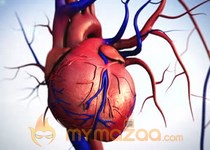


Thousands of miniature human hearts have been grown by scientists to explore a possible cure for a form of heart disease.
The mini organs, which beat of their own accord, have been developed specifically to look at heart hypertrophy – a condition in which the heart muscle thickens, making it harder to pump blood throughout the body.
Researchers at Abertay University in Dundee, Scotland are using the tiny hearts to test potential drugs they hope could eventually stop the development of this disease in those at risk
Made from stem cells, the tiny hearts are just 1 millimeter in diameter and contract at about 30 beats per minute.
Although healthy to begin with, scientists are using chemicals to make them hypertrophic, or enlarged, due to abnormal growth of the cells that make up the heart.
Once diseased, they are then treated with newly developed medications to see if they can prevent damage from occurring.
The research team said that human hearts had been grown in labs before, but this was the first time it had been possible to induce disease in them.
"Heart hypertrophy can be hereditary, can be caused by diseases such as diabetes or can be caused by doing too much strenuous exercise," said lead researcher Professor Nikolai Zhelev. "In some people, a life-threatening abnormal heart rhythm will develop and this is the most common cause of sudden death in young people. Although there are treatments, these only help to control the symptoms, and there is no known cure at the moment."
By finding out which molecules cause the hearts to become enlarged, the team have been able to target the drugs at these molecules and stop them going down the path they would usually take - preventing them from becoming hypertrophic.







